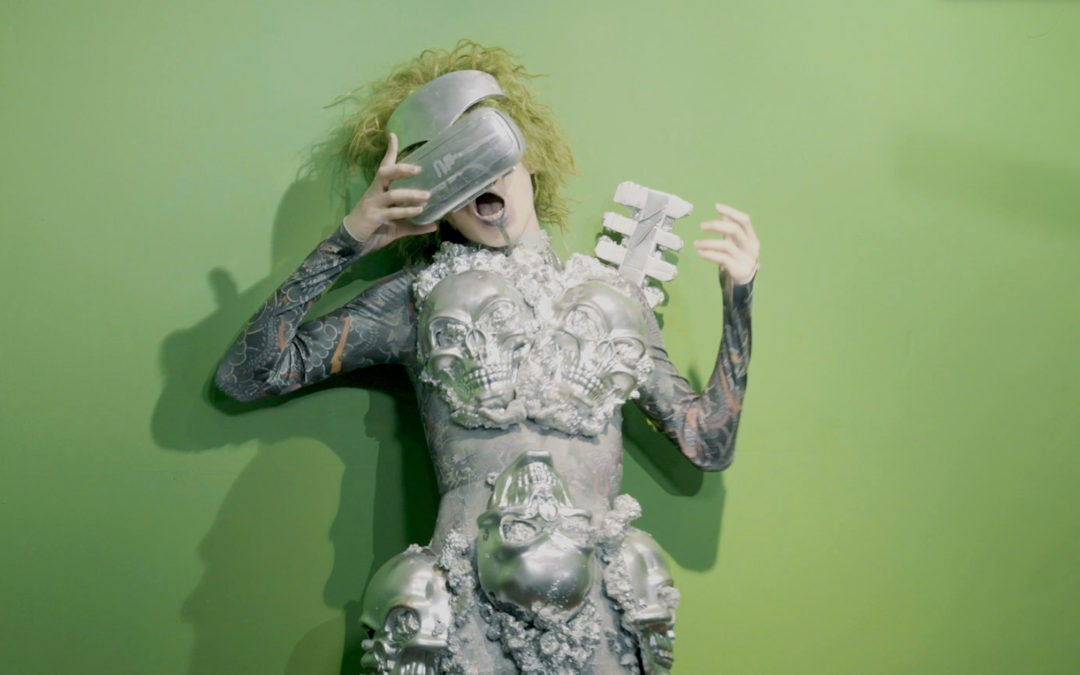
7 PM. Shanghai Changning district. People are busy eating, heading home, or carrying on with their mundane work. But hidden in this ordinary neighborhood there is a mysterious place – a subculture hub that is known throughout the underground scene in Shanghai.

Shanghai Community Radio aka SHCR is a live broadcast platform. Established in 2017, it is now run by Sam Lu, Difan and Katy, and broadcasts live on Chinese video platform Bilibili three to five times a week.


Compared with commercial live-music broadcast platforms like Boiler Room, SHCR is more artistic and experimental. The programmes which run two hours each time features everything from live electronic and experimental music broadcasts to talk shows, performance art pieces, and artist interviews. SHCR specifically designs visuals for each show, using an enormous green screen, giving every performance it’s own twist – a cross between a KTV private session and retro home video.
On June 2nd, Subtropical Asia launched its documentary “Stream It If You’ve Got it (我要当主播)” about SHCR. Check it out now!

01
SHCR started as a archival project for programmes and events held by Basement 6, a non-profit art space which was located in an underground bomb shelter on Huashan Road. It is organized by a group of artists, DJs and producers. In a city built up by consumerist culture, Basement 6 insisted on holding free exhibitions and performances, and aimed to provide an open public space for Shanghai’s local experimental musicians and artists.

Basement 6
As mentioned, SHCR initially appeared for the sake of recording events and exhibitions held at Basement 6. Soon after, everyone realized the true value of these files – a witness to the development of Shanghai’s underground culture. Since then, the focus of SHCR has shifted to building of subculture communities in Shanghai.
Focusing on this new goal while exploring the identity of the ‘Shanghai Artist’, SHCR welcomes all local DJs, experimental musicians, performing artists, and other creatives. You don’t need to be high profile, or have established work. As long as you feel that you have a distinctive voice, or that you have a unique idea, SHCR is where you can go to try it out.

SHCR has become more and more of a public space for subcultures in Shanghai. Apart from experimental music, and artists Q+As, SHCR also broadcast underground cultural programs like CINEMQ, a talk show about LGBTQ films, as well as workshops. And yes, all of SHCR’s broadcasts and activities are all done online. But in the 21st century, who says public spaces must supervene on physical ground? In the Internet era, ‘cloud raves’ are just as exciting as physical raves.

SHCR X CINEMQ

SHCR X NVSHU
02
SHCR’s live broadcasts not only makes it easier to understand and share Shanghai underground scenes, but also connects the often times fragmented Shanghai experimental scenes into a unique cohesive subcultural landscape.
Under the influence of both globalization and the Internet today location appears less and less a label of artistic identity. On the one hand, we could explain the phenomenon by appealing to the fact that the Internet has replaced old physical public spaces like salons, workshops, or even cafes as the places where artists gain their nutrients from; location thus does not have as strong an influence on artists as it used to be. On the other hand, one could also argue that the lack of public spaces and platforms has made it difficult for artists in the Internet era to embody a sense of belonging and recognise a shared identity. This is exactly what SHCR provides for artists in Shanghai.

SHCR’s resident DJs: Jaya、Reefer、Vorbi

As a community platform, SHCR aired more than 100 shows of the ‘Do Not Go Out’ series, during the quarantine period. There were barkeepers sharing cocktail tutorials online, performance artists sharing their chorography, and of course, a lot of DJs playing music in their own homes.
In a time in which all restaurants and bars were closed, and one would have to calculate the number of masks they had left every time to go grocery shopping, “Do Not Go Out” created a strong sense of togetherness. In the digital age, who can deny that being online together is also a form of being together.

STAY HOME KEY VISUAL

Bartender course on SHCR’s Stay Home series

Qingran ‘s dance performance on SHCR’s Stay Home series
As Katy said, radio creates a strong sense of participation. ‘When you turn on the radio and hear the people inside, you know, all of this is happening right now, and if you call them, maybe you can talk to them. ’
03
The emergence of SHCR not only provided a public space for local artists, but also opened up the Shanghai scene to the rest of the world. Last year in November, the LA artist and film director Andrew Thomas Huang went on air for a live Q + A broadcast while traveling in China. The film director has collaborated with artists such as Bjork, FKA Twigs, Radiohead’s Thom Yorke and British director Joe Wright.
During the two hours Q+A, Andrew and Sam chatted causally while eating takeaway food. The topics ranged from Andrew’s collaboration experiences, his journey as an artist, and all aspects of his personal life. Without SHCR, it is difficult to imagine this kind of spontaneous cultural exchange taking place between the Shanghai scene and an international artist.

Andrew Thomas Huang on SHCR
SHCR’s live broadcast guests last year also included Bulma. The hardcore Normand born DJ and producer currently lives in Barcelona. After entering the experimental music scene in 2015, his distinctive 90s style hardcore and electronic sound quickly attracted top labels in Europe and the States. In a live broadcast last November, the DJ gave a 20-minute performance to SHCR audiences.

DJ Bulma on SHCR
In addition to these events, the interview between the music label Scandal leader Eloise and Georgian DJ NDRX on SCHR was equally stirring. NDRX is one of Bassiani’s eight residency artists. Bassiani is one of the best techno clubs in the world. It was established in 2014 on an abandoned Soviet relic – an Olympic-level swimming pool – in the Georgian capital Tbilisi. The swimming pool has become the main dance floor of Bassiani, and can accommodate up to 1,200 people.

Scandal invites NDRX from Bassiani
In Georgia, where conservative Catholic values are still the dominant views, and discrimination against women and LGBTQ groups are still severe, Bassiani is a utopia for many young people. In May of 2018, the Georgian police conducted a drag raid in Bassiani and an LGBTQ club next-door, arresting two of the three founders members of Bassiani and countless more clubgoers. In response to this incident, clubgoers and others from the industry organised a protest on the streets Tbilisi. Eloise and NDRX’s interview revolved around this incident.

Everlast Phantom, the owner of electronic music label Scandal
Reading the above passage, you may have guessed that censorship is one of the main problems faced by SHCR. After experiencing two Bilibili account bans since their humble beginnings, we sincerely hope that in 2020, this vibrant and vital Shanghai subculture platform will continue broadcasting to us the unique voices of Shanghai.
Check Shanghai Community Radio on Instagram
Follow Subtropical Asia on Instagram

